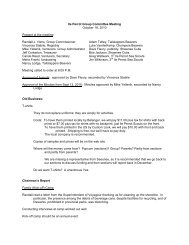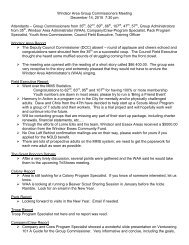Beaver Leader's Handbook - Scouts Canada
Beaver Leader's Handbook - Scouts Canada
Beaver Leader's Handbook - Scouts Canada
You also want an ePaper? Increase the reach of your titles
YUMPU automatically turns print PDFs into web optimized ePapers that Google loves.
HOW SHOULD A VOLUNTEER TALK WITH A CHILD WHO DISCLOSES?<br />
Even if you have read widely about child abuse or attended various kinds of training seminars, it may<br />
be a shock if a child comes forward to talk about abuse. Your duty is not to investigate the matter but<br />
rather to report. It is, therefore, most helpful to:<br />
B-2<br />
1. Believe in the child<br />
2. Listen openly and calmly<br />
3. Reassure the child<br />
4. Write down the facts<br />
5. Report immediately to the child protection authorities and <strong>Scouts</strong> <strong>Canada</strong>.<br />
1. Believe In The Child<br />
There have always been cynics who say that children have terrific imaginations and that stories about<br />
sexual abuse are just part of their fantasy worlds. For most children, sexual abuse is not a fantasy.<br />
Children who disclose sexual abuse often do not attach the same moral values of right and wrong to<br />
the sexual event that an adult would. They may be describing something that is confusing to them,<br />
such as the promise they had to make to the adult “never to tell.” A young child may be preoccupied<br />
with the concern that s/he has been awakened in the night to do something that is hard to understand<br />
and is a “nuisance” to a drowsy child. Often children are more upset by a threat or the psychological<br />
manipulation that has accompanied the sexual abuse than the physical nature of the violation itself.<br />
Children who speak about sexual, physical or emotional abuse struggle with the desire to protect their<br />
abuser. They sense that by telling they may be responsible for bringing even more discomfort to their<br />
lives. Victims of all ages often believe that they are responsible for the abuse they receive and they<br />
hope the violence will just go away. They may delay the disclosure and endure the abuse a long time<br />
before telling.<br />
As a volunteer, keep in mind your belief that this child has come to you with something to tell because<br />
of powerful, hurting feelings. Understand that your relationship has allowed that child to open up to<br />
you. Trust that the child is speaking from a great need and open your heart to believe what you hear.<br />
2. Listen Openly and Calmly<br />
As the child speaks, you may be overwhelmed with your own feelings of anger, of pain, and perhaps<br />
also of fear. At the time of disclosure, put your own feelings aside (you will have time to explore them<br />
later). Be emotionally available to the child, and listen. Give your full attention to the child and nod<br />
understandingly as the story pours out. Do not be judgmental or disparaging of the child, the family,<br />
or the abuser.<br />
To ensure that others do not overhear the child’s message, remove yourselves the necessary distance<br />
from the others but stay in view of the group.<br />
3. Reassure The Child<br />
Let the child know that you believe in him or her. You must be honest with the child by saying that you<br />
cannot keep this a secret, that there are other people who need to know. Explain that you are going<br />
to do your best to help. You cannot promise that the offender will be punished or sent away, nor can<br />
you promise that you can find another home for the child. All that you can promise is that you will do<br />
your best to get the right kind of help. You know where to go for more information and how to bring<br />
the best helpers into the situation. You may also be able to promise that the child can count on your<br />
friendship and support, whatever happens.








